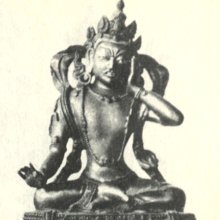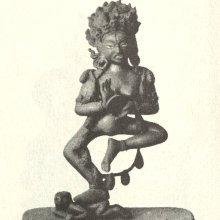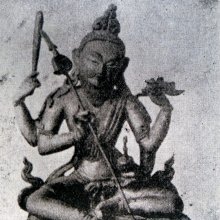Agnideva, Agni-deva, Agnidevā: 9 definitions
Introduction:
Agnideva means something in Buddhism, Pali, Hinduism, Sanskrit. If you want to know the exact meaning, history, etymology or English translation of this term then check out the descriptions on this page. Add your comment or reference to a book if you want to contribute to this summary article.
Images (photo gallery)
In Hinduism
Purana and Itihasa (epic history)
Source: JatLand: List of Mahabharata people and placesAgnideva (अग्निदेव) is a name mentioned in the Mahābhārata (cf. ) and represents one of the many proper names used for people and places. Note: The Mahābhārata (mentioning Agnideva) is a Sanskrit epic poem consisting of 100,000 ślokas (metrical verses) and is over 2000 years old.

The Purana (पुराण, purāṇas) refers to Sanskrit literature preserving ancient India’s vast cultural history, including historical legends, religious ceremonies, various arts and sciences. The eighteen mahapuranas total over 400,000 shlokas (metrical couplets) and date to at least several centuries BCE.
In Buddhism
Tibetan Buddhism (Vajrayana or tantric Buddhism)
Source: archive.org: The Indian Buddhist IconographyAgnideva (अग्निदेव) is another name for Agni: one of the eight Dikpālas, commonly depicted in Buddhist Iconography, and mentioned in the 11th-century Niṣpannayogāvalī of Mahāpaṇḍita Abhayākara.—His Colour is red; his Vehicle is the goat; he has two arms. [...] As Agnideva his forms occur twice in the Chinese collection.

Tibetan Buddhism includes schools such as Nyingma, Kadampa, Kagyu and Gelug. Their primary canon of literature is divided in two broad categories: The Kangyur, which consists of Buddha’s words, and the Tengyur, which includes commentaries from various sources. Esotericism and tantra techniques (vajrayāna) are collected indepently.
Languages of India and abroad
Sanskrit dictionary
Source: DDSA: The practical Sanskrit-English dictionaryAgnideva (अग्निदेव).—[agni- reva devaḥ] Agni; a worshipper of Agni.
Derivable forms: agnidevaḥ (अग्निदेवः).
Agnideva is a Sanskrit compound consisting of the terms agni and deva (देव).
--- OR ---
Agnidevā (अग्निदेवा).—[agnirdevo yasyāḥ] the third lunar mansion, the Pleiades (kṛttikā).
Agnidevā is a Sanskrit compound consisting of the terms agni and devā (देवा).
Source: Cologne Digital Sanskrit Dictionaries: Shabda-Sagara Sanskrit-English DictionaryAgnideva (अग्निदेव).—m.
(-vaḥ) 1. Agni, the god of fire. 2. A worshipper of fire. f.
(-vā) A name of the third lunar mansion, identified with the Pleiades: Agni being the ruling deity of the constellation. Also agnidevatā.
Source: Cologne Digital Sanskrit Dictionaries: Monier-Williams Sanskrit-English Dictionary1) Agnideva (अग्निदेव):—[=agni-deva] [from agni] m. Agni
2) Agnidevā (अग्निदेवा):—[=agni-devā] [from agni-deva > agni] f. = -nakṣatra, q.v., [cf. Lexicographers, esp. such as amarasiṃha, halāyudha, hemacandra, etc.]
Source: Cologne Digital Sanskrit Dictionaries: Goldstücker Sanskrit-English DictionaryAgnideva (अग्निदेव):—I. [karmadharaya compound] m.
(-vaḥ) Agni, the god of fire. Ii. [bahuvrihi compound] 1. m.
(-vaḥ) A worshipper of fire. 2. f.
(-vā) A name of the third lunar mansion, identified with the Pleiades: Agni being the ruling deity of the constellation. Also agnidevatā. E. agni and deva.
Source: Cologne Digital Sanskrit Dictionaries: Yates Sanskrit-English DictionaryAgnidevā (अग्निदेवा):—[agni-devā] (vā) 1. f. The Pleiades.
[Sanskrit to German]
Sanskrit, also spelled संस्कृतम् (saṃskṛtam), is an ancient language of India commonly seen as the grandmother of the Indo-European language family (even English!). Closely allied with Prakrit and Pali, Sanskrit is more exhaustive in both grammar and terms and has the most extensive collection of literature in the world, greatly surpassing its sister-languages Greek and Latin.
See also (Relevant definitions)
Partial matches: Agni, Deva, Ani, Teva.
Starts with: Agnidevata, Agnidevatya.
Full-text: Agninakshatra, Agnihotra, Kumbharetas, Jvalajihva, Agnishoma, Duryodhana, Agni, Yajurveda, Punarvasu, Agnipurana, Shanti, Nila, Cakra, Gomati, Shiva, Tiruchendur, Kili, Prabhasa, Shuci.
Relevant text
Search found 17 books and stories containing Agnideva, Agni-deva, Agnidevā, Agni-devā; (plurals include: Agnidevas, devas, Agnidevās, devās). You can also click to the full overview containing English textual excerpts. Below are direct links for the most relevant articles:
Puranic encyclopaedia (by Vettam Mani)
The Indian Buddhist Iconography (by Benoytosh Bhattachacharyya)
Animal Kingdom (Tiryak) in Epics (by Saranya P.S)
The Markandeya Purana (by Frederick Eden Pargiter)
List of Mahabharata people and places (by Laxman Burdak)
Atithi or Guest Reception (study) (by Sarika. P.)
Part 12 - References to Hospitality in Pañcatantra < [Chapter 4 - Atithi-saparyā in Classical Sanskrit Literature]
Part 2 - Treatment of Atithi (guest-reception) in Mahābhārata < [Chapter 3 - Atithi-saparyā in Epics and Purāṇas]


